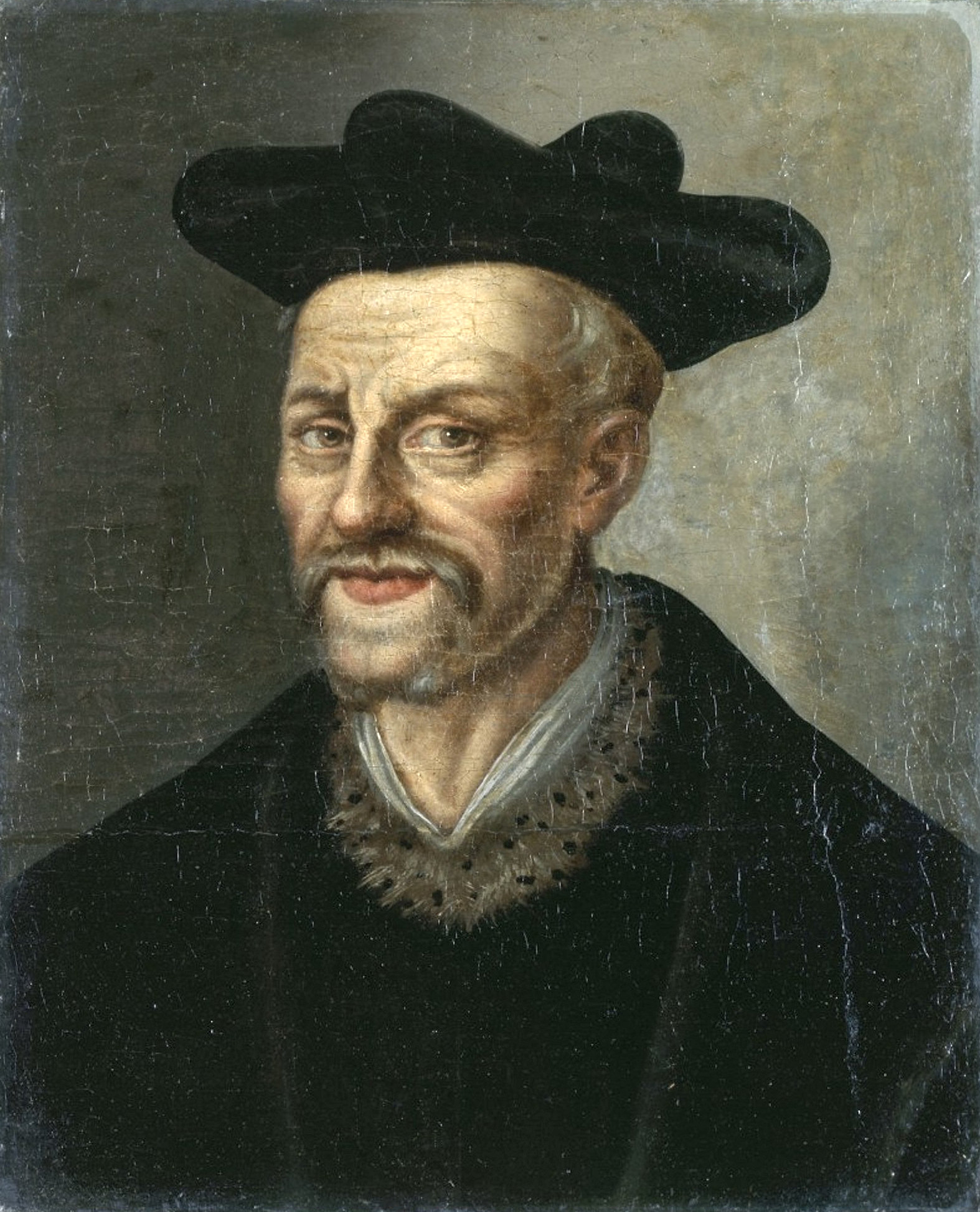Source: Gargantua and Pantagruel (1532–1564), Fourth Book (1548, 1552), Chapter 38.
Francois Rabelais Quotes
“What cannot be cured must be endured.”
Source: Gargantua and Pantagruel (1532–1564), Fifth Book (1564), Chapter 15.
“I drink no more than a sponge.”
Source: Gargantua and Pantagruel (1532–1564), Gargantua (1534), Chapter 5.
“What is got over the Devil's back is spent under the belly.”
Source: Gargantua and Pantagruel (1532–1564), Fifth Book (1564), Chapter 11.
“Scampering as if the Devil drove them.”
Source: Gargantua and Pantagruel (1532–1564), Fourth Book (1548, 1552), Chapter 62.
“We saw a knot of others, about a baker's dozen.”
Source: Gargantua and Pantagruel (1532–1564), Fifth Book (1564), Chapter 22.
“You are Christians of the best edition, all picked and culled.”
Source: Gargantua and Pantagruel (1532–1564), Fourth Book (1548, 1552), Chapter 50.
Source: Gargantua and Pantagruel (1532–1564), Fifth Book (1564), Chapter 15.
“Above the pitch, out of tune, and off the hinges.”
Source: Gargantua and Pantagruel (1532–1564), Fourth Book (1548, 1552), Chapter 19.
Source: Gargantua and Pantagruel (1532–1564), Fifth Book (1564), Chapter 20 : How the Quintessence cured the sick with a song
“By robbing Peter he paid Paul, … and hoped to catch larks if ever the heavens should fall.”
Source: Gargantua and Pantagruel (1532–1564), Gargantua (1534), Chapter 11.
“This flea which I have in mine ear.”
Source: Gargantua and Pantagruel (1532–1564), Third Book (1546), Chapter 31.
“The Devil was sick,—the Devil a monk would be;
The Devil was well,—the devil a monk was he.”
Source: Gargantua and Pantagruel (1532–1564), Fourth Book (1548, 1552), Chapter 24.
Prologue.
Gargantua and Pantagruel (1532–1564), Gargantua (1534)
“You shall never want rope enough.”
Author's prologue.
Gargantua and Pantagruel (1532–1564), Fifth Book (1564)
“I believe he would make three bites of a cherry.”
Source: Gargantua and Pantagruel (1532–1564), Fifth Book (1564), Chapter 28.
“Subject to a kind of disease, which at that time they called lack of money.”
Source: Gargantua and Pantagruel (1532–1564), Pantagruel (1532), Chapter 16.
Source: Gargantua and Pantagruel (1532–1564), Fifth Book (1564), Chapter 19 : How we arrived at the queendom of Whims or Entelechy
“The belly has no ears nor is it to be filled with fair words.”
Original: …l'estomach affamé n'a poinct d'aureilles, il n'oyt goutte.
Source: Gargantua and Pantagruel (1532–1564), Fourth Book (1548, 1552), Chapter 63.
“Send them home as merry as crickets.”
Source: Gargantua and Pantagruel (1532–1564), Gargantua (1534), Chapter 29.
“Thought I to myself, we shall never come off scot-free.”
Source: Gargantua and Pantagruel (1532–1564), Fifth Book (1564), Chapter 15.
Et guerre faicte sans bonne provision d'argent, n'a qu'un souspirail de vigueur. Les nerfz des batailles sont les pecunes.
Source: Gargantua and Pantagruel (1532–1564), Gargantua (1534), Chapter 44.
“Appetite comes with eating, says Angeston. But the thirst goes away with drinking.”
Source: Gargantua and Pantagruel (1532–1564), Gargantua (1534), Chapter 5.
“Thought the moon was made of green cheese.”
Source: Gargantua and Pantagruel (1532–1564), Gargantua (1534), Chapter 11.
“He laid him squat as a flounder.”
Source: Gargantua and Pantagruel (1532–1564), Gargantua (1534), Chapter 27.
“Plain as the nose in a man's face.”
Author's prologue.
Gargantua and Pantagruel (1532–1564), Fifth Book (1564)
“He did not care a button for it.”
Source: Gargantua and Pantagruel (1532–1564), Gargantua (1534), Chapter 16.
“How well I feathered my nest.”
Source: Gargantua and Pantagruel (1532–1564), Gargantua (1534), Chapter 17.
“I have nothing, owe a great deal, and the rest I leave to the poor.”
Je n'ai rien vaillant; je dois beaucoup; je donne le reste aux pauvres.
His one line will, as quoted in Arthur Machen : A Short Account of His Life and Work (1964) by Aidan Reynolds and William E. Charlton, p. 186.
Source: Gargantua and Pantagruel (1532–1564), Third Book (1546), Chapter 52 : How a certain kind of Pantagruelion is of that nature that the fire is not able to consume it
Source: Gargantua and Pantagruel (1532–1564), Fourth Book (1548, 1552), Chapter 23.
Source: Gargantua and Pantagruel (1532–1564), Fifth Book (1564), Chapter 6.
Author's prologue.
Gargantua and Pantagruel (1532–1564), Fifth Book (1564)
“Looking as like…as one pea does like another.”
Source: Gargantua and Pantagruel (1532–1564), Fifth Book (1564), Chapter 2.
“Whose cockloft is unfurnished.”
Author's prologue
Prologue.
Gargantua and Pantagruel (1532–1564), Fifth Book (1564)
Source: Gargantua and Pantagruel (1532–1564), Gargantua (1534), Ch. 57 : How the Thelemites were governed, and of their manner of living; the famous dictum of the abbey of Theleme presented here, "Do what thou wilt" (Fais ce que voudras), evokes an ancient expression by St. Augustine of Hippo: "Love, and do what thou wilt." The expression of Rabelais was later used by the Hellfire Club established by Sir Francis Dashwood, and by Aleister Crowley in his The Book of the Law (1904): "Do what thou wilt shall be the whole of the Law."
Natura abhorret vacuum.
Chapter 5 http://books.google.com/books?id=tBROAAAAcAAJ&q=%22natura+abhorret+vacuum%22&pg=PA22#v=onepage.
Gargantua and Pantagruel (1532–1564), Gargantua (1534)
Source: Gargantua and Pantagruel (1532–1564), Gargantua (1534), Chapter 54 : The inscription set upon the great gate of Theleme
Source: Gargantua and Pantagruel (1532–1564), Gargantua (1534), Chapter 54 : The inscription set upon the great gate of Theleme.
Source: Gargantua and Pantagruel (1532–1564), Gargantua (1534), Chapter 54 : The inscription set upon the great gate of Theleme.
